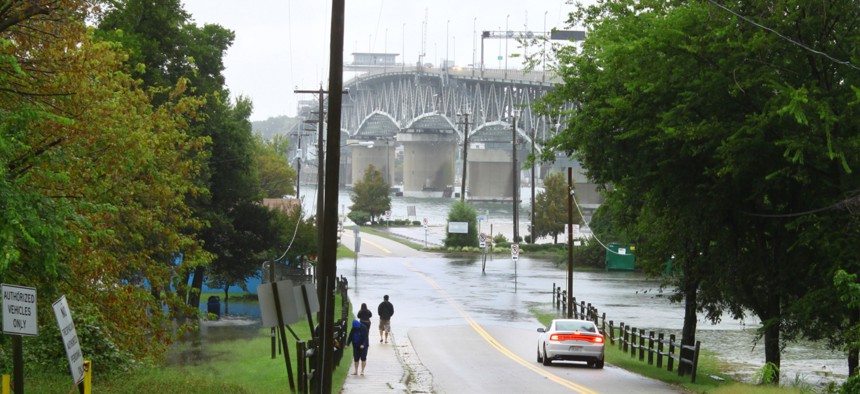Entrepreneurs May Yet Save Us From Climate Change

In 2014 Hurricane Joaquin and a stalled front combine to create major coastal flooding in low-lying areas in Virginia's Chesapeake Bay. Pictured: Gloucester, VA Barry Blackburn / Shutterstock.com
COMMENTARY | Adapting to climate change will require new approaches at the local level. On the Chesapeake Bay, entrepreneurs are being incentivized to find the answers.
Across the country, entrepreneurs are developing innovative solutions to some of the biggest climate change challenges we face. From floating houses to developing the next generation of low-cost flood sensors and more effective oyster reefs to protect shorelines, local-level innovations can make all the difference in helping our coastal communities adapt to the impacts of climate change and remain vibrant in the decades to come.
There are good reasons for identifying new solutions to this looming crisis. The traditional massive infrastructure projects—such as floodwalls and pumps—take years and billions of dollars; furthermore, few communities are able to afford and maintain them.
In order for us to accelerate progress on this urgent issue, governments, universities, scientists and businesses must be able to cut the red tape and support entrepreneurs who can scale their innovations into self-sustaining businesses that offer a wider range of affordable solutions that help communities reduce risks now.
Here in Virginia, we are attempting to do just that.
A new public innovation model based on challenge competitions is being implemented in Hampton Roads, Virginia by our non-profit organization, RISE. Startups like Constructis, Resilient Enterprise Solutions, and GROW Oyster Reefs will be relocating to the region to take advantage of access to the region’s infrastructure, data, experts, and financing to develop their innovations and scale them into sustainable business opportunities while helping to protect Virginia’s vital coastal communities.
These competitions are unlocking smart, sustainable ideas to encourage innovation and attract outside investment. In fact, this year RISE received over 50 applications to its $1.2 million challenge, and has selected six entrepreneurs. The projects, which range from developing a system for energy harvesting from roads to flood reduction through new water retention cisterns, will receive funding and other services coordinated by RISE. We will open another competition cycle in the summer of 2019 with significantly more funding available.
Through these competitions, and the establishment of a resilience hub, the region has become a hospitable real-world test bed for companies, where the products and services we need to adapt to the impacts of climate change can be developed and tested locally and applied globally. This model provides essential support to nurture these entrepreneurs, from financial assistance to facilitating access to real-world demonstration spaces, data, and mentors. Developing relationships with local governments, universities, and investors will shorten the lag time between a company’s idea and execution.
Climate adaptation is not a one-size-fits-all process, but a response that gets the maximum number of people thinking and working on innovative solutions key to coastal cities’ survival. By incentivizing entrepreneurs to set up shop in a resilience hub like Hampton Roads, we can develop cutting-edge solutions to resilience challenges and scale these solutions into thriving businesses, helping communities tackle the threats of climate change while creating jobs and bolstering local economies.
Most governments—federal, city and state, even worldwide—have limited budgets. Therefore, experimentation, development, and knowledge sharing should be the natural mode for resilience work. With over one million dollars to invest in small businesses in 2019 alone—and a wide network to help get their ideas from the lab into the real-world—RISE believes our model can help the public sector overcome these limitations.
At a time of unprecedented technological progress, the public and private sector have a duty to be more responsive to new emerging business models that encourage innovation. And with increasing federal, state, and local fiscal pressures this responsibility is no longer an option, but fast becoming a requirement. Innovation is not a panacea for solving the catastrophic effects of climate change on our coastal cities—it is an intermediate step that will reduce costs and accelerate results now, giving time for leaders to plan for tomorrow.
Dr. Paul Robinson is the Executive Director of RISE. Dr. Katerina Oskarsson serves as the organization's Chief Strategy Officer.
NEXT STORY: People don’t trust blockchain systems -- is regulation a way to help?





